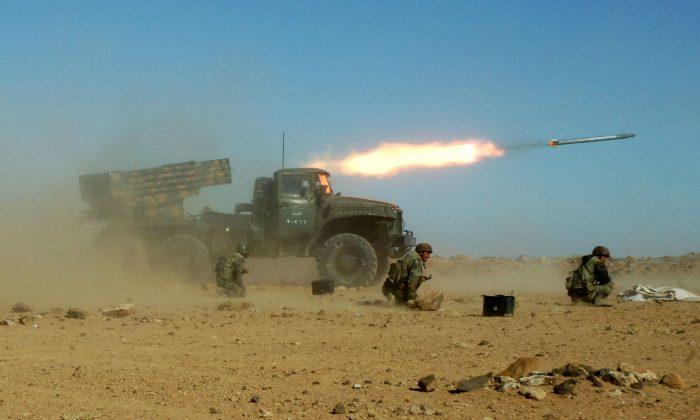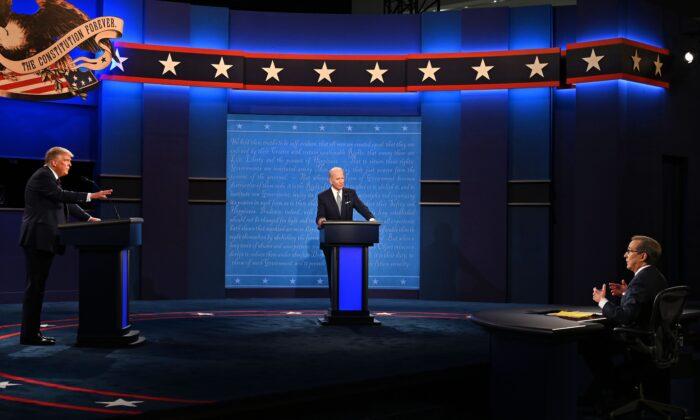At first glance, it is a paradox. The United States and its allies may soon launch a military strike against Syria with the stated purpose of punishing the Assad regime for using chemical weapons.
However, they may also calibrate the attacks to enable the regime to maintain control over its chemical weapons caches throughout and after the punitive strikes.
While a proposed military strike by President Obama would be a precision attack and limited in scope, it could nonetheless tip the delicate power balance in Syria in favor of opposition groups, among which al-Qaeda affiliated fighters are the strongest and most organized—potentially giving them control over the chemical weapons caches.
According to a declassified French intelligence report released Sept. 3, Syria has over 1,000 tons of chemical agents, making it one of the world’s largest weapons stockpiles. The chemicals include sulfur mustard, sarin, and VX, the last of which is considered the most toxic among known warfare agents.
Article Continues after the discussion. Vote and comment
[tok id=42820e92e8f70514dffba41c65ad2201 partner=1966]
Syria’s chemical weapon stockpiles are secured by special forces dispatched by the Assad regime, according to a congressional research report published Aug. 20. According to the report, U.S. officials have expressed confidence that the stockpiles are still under Assad’s control.
Boots on the Ground
The United States has been preparing for scenarios to secure the chemical weapons in the event that the Assad regime loses power. In such a case, “the intelligence community and Special Forces units would likely play a major role in locating and securing such weapons in a combat environment,” states the report.
According to Kerry Patton, an expert on terrorism and intelligence, and author of “Contracted: America’s Secret Warriors,” securing the chemical weapon stocks in such a scenario would require engagement by ground troops.
A defense assessment by the Pentagon leaked by senior officials to the media in November 2012 stated that over 75,000 troops would be required to neutralize Syria’s chemical weapon stockpiles.
But any such action would be highly unlikely, as President Obama has said that the proposed operation in Syria “does not involve boots on the ground.”
Risk of Weapons Leaving Syria
One option considered by the United States is to train or assist the Free Syrian Army to secure the chemical weapons, to protect them from being seized by extremist elements.
But according to terrorism expert, Max Abrahms, the “al Qaeda side is considerably stronger,” than the Free Syrian Army.
While the Syrian civil war started out with defectors from the Syrian army, united under the name Free Syrian Army, gradually foreign jihadist have flocked to Syria. “There might be up to 10,000 foreign jihadists in Syria right now from over 60 countries,” Abrahms said.
According to Abrahms there is a risk of weapons leaving the Syrian landscape, and instead being used in other conflict zones. “These foreign jihadists, they are in no way embedded to the Syrian landscape. It wouldn’t surprise me that they would take them to the next conflict zone.”
The U.S. Department of Defense has said it is working closely with Syria’s neighbors, such as Jordan, Iraq, and Turkey.
“The Department of Defense is funding over $70 million for activities in Jordan including providing training and equipment to detect and stop any chemical weapons transfers along its border with Syria and developing Jordanian capacity to identify and secure chemical weapons assets,” Secretary of Defense Chuck Hagel told the Senate Armed Service Committee on April 18.
Syria’s chemical weapons program has been monitored for a long time by the intelligence services of several nations.
“The U.K. has been operationally securing the stockpiles, they are not necessarily in the country securing them, but they are using specific assets,” Patton said.
British Defense Secretary Philip Hammond, speaking on May 2, said, “I think we have a great deal of knowledge of location of chemical weapons. ... That is not the same as saying that I can put my hand on my heart and say we know where every last item is.”
Lessons from Libya
In Libya, after former dictator Moammar Qadhafi was toppled in 2011, forces aligned to the United States secured the weapons, according to the congressional research report.
However intelligence on Libya’s weapons of mass destruction failed to detect additional stocks hidden by the Qadhafi regime, and only discovered after the regime fell.
Leon Panetta, defense secretary at the time, told the Senate Armed Services Committee on March 7, 2012, that the situation in Syria is “100 times worse than what we dealt with in Libya. And for that reason, that’s why it’s raised even greater concerns about our ability to address how we can secure those sites.”





Friends Read Free